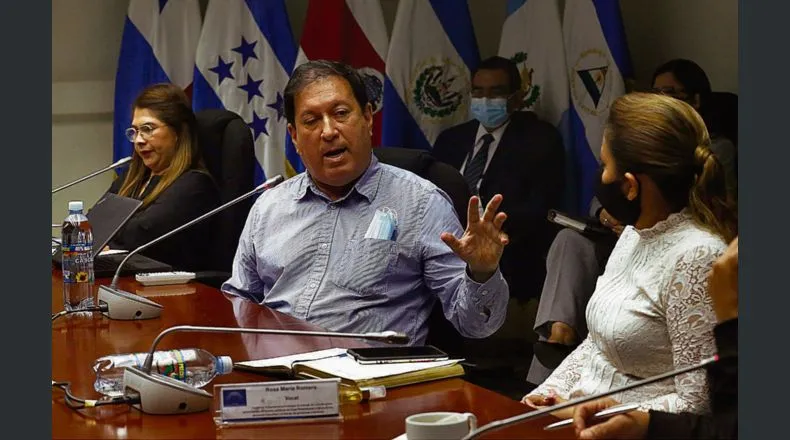In a hearing before a special legislative committee created to investigate supposed illegal payments made by former governments, three prominent former public servants testified about the payments they received and sustained that all those payments were legal and corresponded to professional services. Former president of the Salvadoran Banco Central Carlos Acevedo testified that he received monthly bonifications backed by provisions in the National Budget. He also expressed that the current government of president Bukele uses payments additional to their formal salary to pay its top officials, and asked them to investigate the practice of bribing legislators, using secret funds of the presidency, that were usual and frequent during the Tony Saca and Mauricio Funes administrations and were received by several lawmakers with close links to the current government.
Roberto Rubio, the director of the Salvadoran branch of Transparency International and an outspoken critic of corruption and lack of transparency in the Bukele government, was aggressively interrogated about payments he received as member of the National Development Council that worked under three former presidents. Salvador Samayoa, who negotiated and signed the 1992 Peace Agreement that put an end to the Salvadoran civil war, was also interrogated as member of that Council. Both explained that they were hired as independent counsels to design the national development strategies that led to the first “Fomilenium” agreement with United States to finance investments and infrastructure in the northern part of the country. They worked full time and received monthly fees of $2,300.
Salvador Samayoa also served previously as head of the Council of Public Security, which designed policies of social inclusion in low income communities. The legislators tried to interrogate Mr. Rubio and Mr. Samayoa about their political opinions and their public standing as critics of the current government. Observers commented that this attempt to destroy the reputation of two respected intellectuals and public figures will backfire on the government, because both of them confronted the televised depositions with facts, rational arguments and personal dignity.
All three personalities interrogated by the committee used the hearing to express their critic that this investigation does not include the public spending of the current government.
EDH: En comisión legislativa, Acevedo, Rubio y Samayoa defienden la legalidad de pagos recibidos
LPG: Samayoa, Acevedo y Rubio defienden legalidad de pagos
Diputados de Nuevas Ideas intentan de destruir la reputación de tres críticos al gobierno
En una audiencia ante una comisión especial del Legislativo creada para investigar presuntos pagos ilegales hechas por anteriores gobiernos, tres prominentes ex servidores públicos testificaron sobre las modalidad de su trabajo, sus contratos y defendieron la legalidad de los pagos recibidos por su desempeño y sus servicios profesionales.
Carlos Acevedo, el ex presidente del Banco Central en el gobierno de Mauricio Funes, testificó que todas las bonificaciones que recibió mensualmente estaban respaldadas por la Ley de Presupuesto. Expresó que el gobierno Bukele uso diferentes figuras legales, pero también paga salarios aumentados a sus funcionarios, y exigió que también se investigaran los sobornos que los gobiernos de Tony Saca y Mauricio Funes pagaron de fondos reservados de la presidencia a legisladores de GANA, hoy aliados de Bukele.
Roberto Rubio, director de la oficina salvadoreña de Transparencia Internacional y articulado crítico de las prácticas corruptas y la falta de transparencia en el gasto público del actual gobierno, fue agresivamente interrogado sobre los pagos que recibió como miembro del Consejo Nacional de Desarrollo, que funcionó bajo tres diferentes gobiernos.
Salvador Samayoa, quien negoció y firmó los Acuerdos de Paz de 1992, también fue interrogado como ex miembro de este Consejo. Ambos explicaron que trabajaron como expertos independientes para diseñar las estrategias nacionales de desarrollo, los cuales fueron la base para el proyecto Fomilenio I en la zona Norte del país. Trabajaron a tiempo completo y recibieron honorarios de $2,300 mensuales.
Salvador Samayoa también fungió anteriormente como jefe del Consejo de Seguridad Pública, que designaba políticas de inclusión social en las comunidades marginadas.
Los diputados de Nuevas Ideas intentaron interrogar a Samayoa y Rubio sobre las opiniones y trayectorias políticas y sobre su rol de críticos al actual gobierno. Observadores comentaron que este intento de destruir la reputación de dos figuras públicas respetados por sus posiciones críticas deja mal parado al gobierno, ya que ambos enfrentaron los interrogatorios televisados con hechos, cifras, argumentos racionales y dignidad personal.
Los tres testigos convocados por la comisión aprovecharon la audiencia para expresar su crítica al hecho que esta investigación no incluye el uso de fondos públicos bajo en actual gobierno.
EDH: En comisión legislativa, Acevedo, Rubio y Samayoa defienden la legalidad de pagos recibidos

